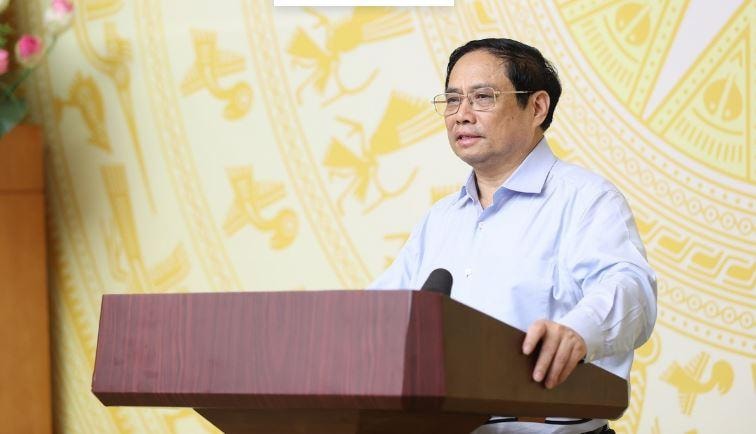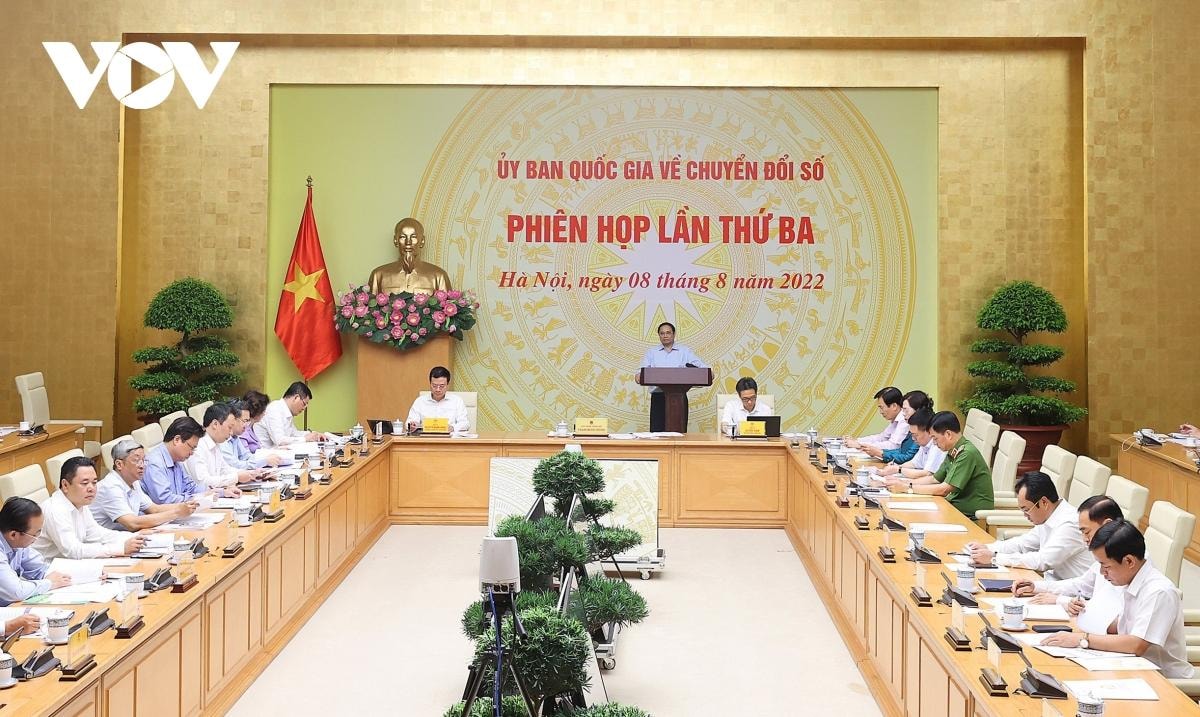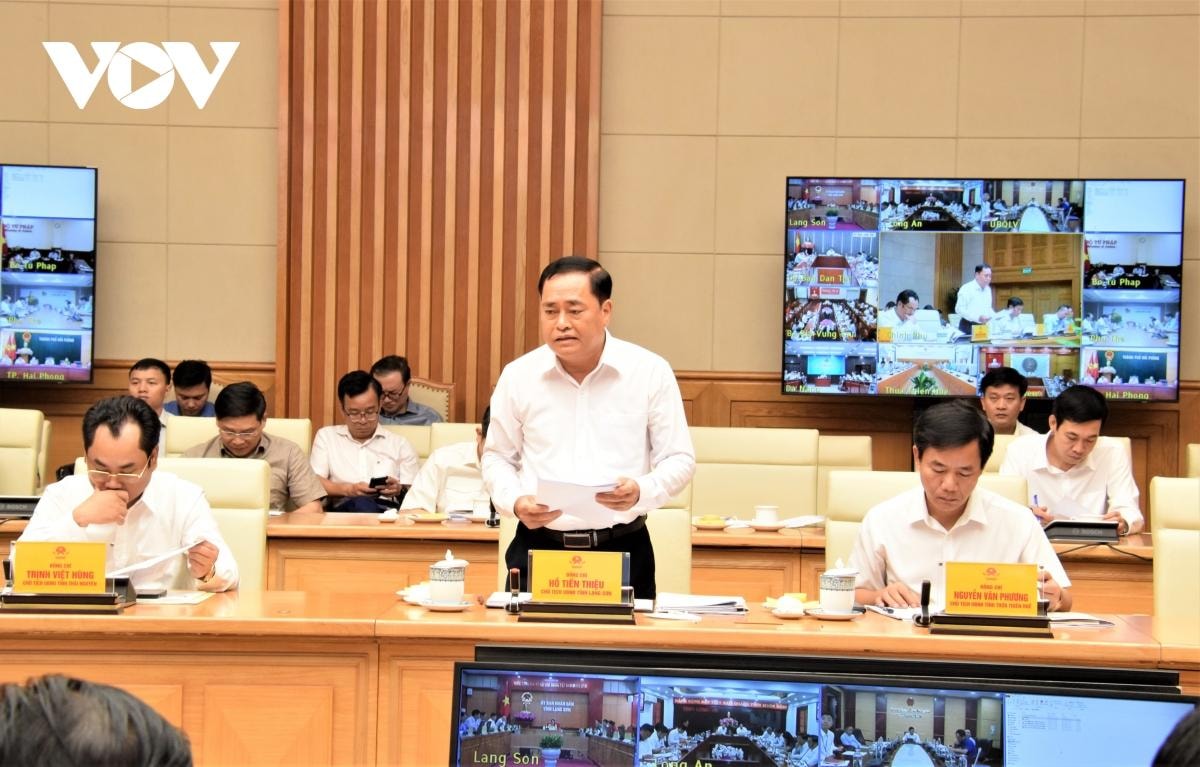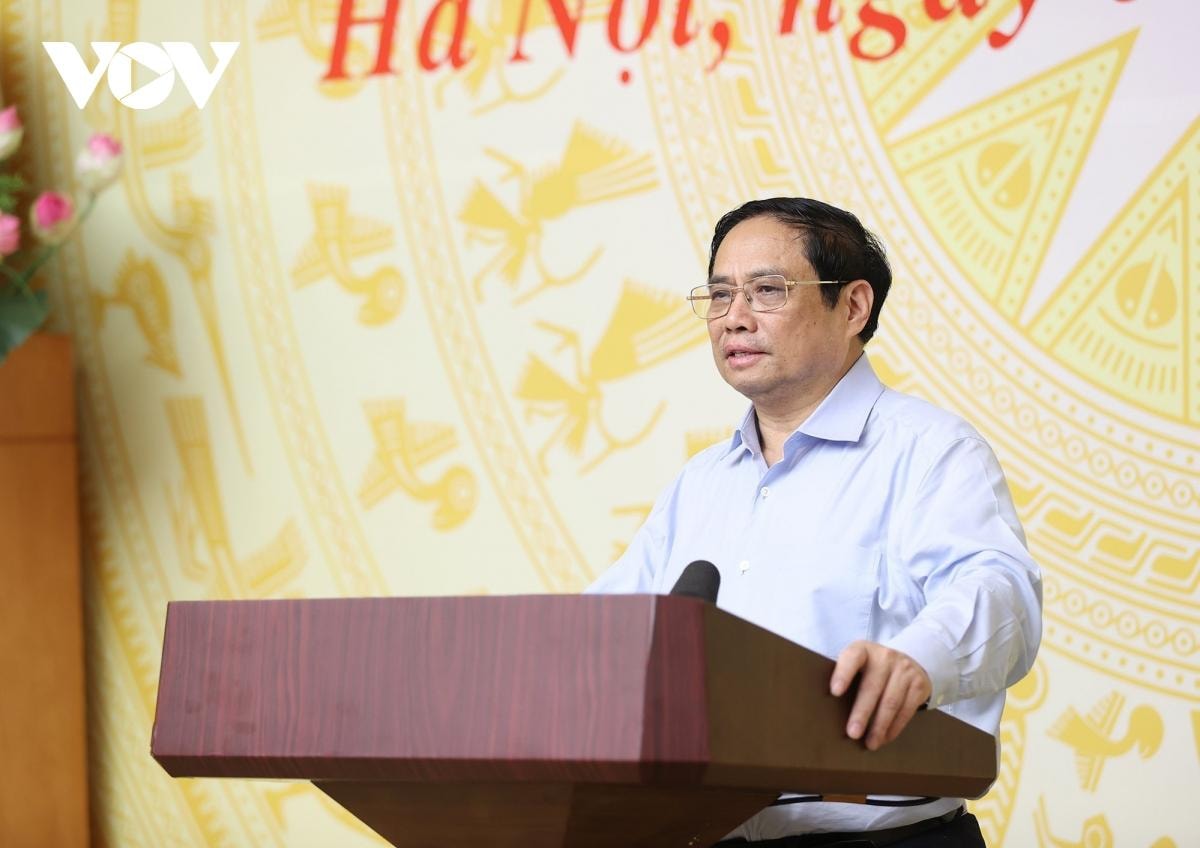Digital transformation to make it more convenient for people and businesses to use public services
According to Prime Minister Pham Minh Chinh, digital transformation must enable people and businesses to use public services and social utilities more conveniently, faster, and more effectively than before.
Speaking at the third meeting of the National Committee on Digital Transformation to evaluate the results of digital transformation in the first 6 months of 2022 and identify solutions and tasks for digital transformation in the coming time (taking place on the morning of August 8), Prime Minister Pham Minh Chinh emphasized that it is necessary to continuously innovate, have breakthrough thinking and strategic vision, promote proactiveness, creativity, promote solidarity, the more difficult and challenging it is, the more solidarity is needed, avoid all thinking of "separate information, figures, data", ministries and branches according to their assigned functions and tasks of data management, but above all, they are national assets, these assets can only be enriched when they are connected, shared, authenticated together towards the ultimate goal of best serving the people.
Accelerate digital transformation quickly, effectively and substantially
Speaking at the opening of the meeting, Prime Minister Pham Minh Chinh emphasized that digital transformation is an inevitable trend, an objective requirement of development and is identified as a mandatory requirement. Digital transformation helps effectively resolve the relationship between the State, the market and society; promotes economic growth, improves labor productivity, competitiveness, production and business efficiency, reduces costs for people and businesses, and helps all levels and sectors change methods and improve management and operation capacity. Applying information technology and digital transformation is consistent with the qualities and capacities of Vietnamese people who are industrious, eager to learn, flexible and creative.
The process of digital transformation in the country is taking place very strongly and extensively. As the COVID-19 pandemic develops complicatedly, digital transformation becomes an urgent requirement for all levels, sectors, localities, people and businesses to both effectively prevent and fight the pandemic and recover and develop the socio-economy. When the pandemic is controlled, digital transformation continues to be a key task, contributing significantly to rapid recovery, sustainable socio-economic development, building an independent and self-reliant economy associated with proactive, active, deep, substantial and effective international integration; taking internal resources as fundamental, strategic, decisive and long-term, external resources as important and breakthrough; focusing on implementing 3 strategic breakthroughs in institutions, human resources and infrastructure.
Digital transformation is a major policy and orientation of the Party and the State, and is a task that must be regularly and continuously monitored, evaluated, urged, closely directed and resolutely implemented. The problem for us is to promote digital transformation quickly, effectively and substantially.
The Prime Minister stated that the task of the National Committee on Digital Transformation is very heavy; we must direct and organize the implementation of guidelines, mechanisms and policies to promote the national digital transformation process, closely linked with administrative reform; build and develop e-Government, digital Government, digital economy, digital society and smart cities; facilitate the implementation of the 4th Industrial Revolution in Vietnam.
 |
Prime Minister Pham Minh Chinh delivered the opening speech at the conference. Photo vov.vn |
In this session, the Prime Minister asked delegates to frankly and objectively evaluate, with specific data, the implementation of tasks in the past time, in the spirit of neither beautifying nor defaming; evaluate both the tasks assigned according to the 2022 Action Plan of the National Committee on Digital Transformation and the tasks assigned at the previous meeting of the Committee.
Digital transformation must be considered a major movement.
According to the report of the Ministry of Information and Communications, in the first 6 months of the year, the national digital transformation has achieved many important results, awareness of the importance of digital transformation continues to change positively at all levels and sectors, especially among leaders. From changing awareness leads to drastic action: most ministries, sectors and localities have issued resolutions of the Party Committee, 5-year and annual government plans on digital transformation; Digital Transformation Steering Committees of all 22/22 ministries, sectors and 63/63 localities have been established and put into operation. The specialized data transmission network of Party and State agencies connecting 4 administrative levels continues to be developed: connected to 100% of districts; more than 97% of communes nationwide.
 |
Overview of the third meeting of the National Committee on digital transformation. |
The National Public Service Portal has provided 3,699 online public services at levels 3 and 4; more than 2.1 million registered accounts, an increase of more than 2.8 times over the same period; Information safety and security continue to be of concern, Vietnamese enterprises are gradually mastering the network information security ecosystem.
Developing digital economy and digital society, the contribution of digital economy to GDP continues to increase; many businesses actively transform digitally; electronic tax and electronic invoices are popularized. People actively use information technology applications and national public services in economic and social activities.
In particular, some targets in the National Committee's Action Plan on Digital Transformation in 2022 have soon achieved their set targets, such as: the rate of enterprises using electronic invoices is 100%, achieving the set target; the proportion of e-commerce revenue in total retail sales is 11.27%, exceeding the set target of 7%; the rate of people aged 15 and over with payment accounts is 66%, exceeding the set target of 65%.
At the meeting, leaders of ministries, localities and businesses contributed ideas, shared experiences and made recommendations on digital transformation in their units. Chairman of Lang Son Provincial People's Committee Ho Tien Thieu requested the Ministry of Information and Communications to consider and study the digital border gate model that Lang Son province has piloted to continue to direct the completion, to replicate and apply nationwide, and at the same time study and support localities to move towards the idea of building digital borders, connecting and sharing specialized data with the digital border gate platform to maximize the effectiveness of this platform.
 |
Mr. Ho Tien Thieu - Chairman of Lang Son Provincial People's Committee spoke at the conference. |
From the practical experience of Thai Nguyen province, Chairman of the Provincial People's Committee Trinh Viet Hung suggested that digital transformation should be considered a campaign like the large campaigns that we are carrying out on a national scale. In addition, the development of electronic payment services needs to be integrated into every transaction in daily life, from urban to rural areas, especially serving daily payment activities to create usage habits and people's access to services, bringing practical economic effects, transaction safety and convenience.
Regarding the development and training of human resources for digital transformation, Mr. Nguyen Trung Chinh, Chairman of CMC, commented: “We think that building a pilot model of digital universities is very important, but here we do not have to select the number of schools to pilot the digital university model. I think it is more important that we build universities that can all study and apply digital universities in their teaching and training. In the project, we currently only see 5 large universities, but many times small universities have the advantage because they solve the problem of human resources faster and with higher quality.”
Effectively mobilize all resources to participate in digital transformation
After listening to the comments and discussions, concluding the meeting, Prime Minister Pham Minh Chinh acknowledged the very positive results in digital transformation work in recent times, and also pointed out the existing limitations. The Prime Minister pointed out that these are only initial results, we still have many difficulties and problems to solve, and many things to do ahead. To achieve the set goals, we must have high determination, great efforts, drastic, practical and effective actions, and focus on key points; with a number of key viewpoints, orientations and tasks such as: Digital transformation must be an important tool in building an independent and self-reliant economy, associated with proactive, active international integration, deep, substantial and effective. Maximize the strength of traditional Vietnamese culture and intelligence.
Promoting the spirit of solidarity, the more difficult and challenging the situation, the more solidarity is needed, this is a precious tradition of the nation and also a consistent viewpoint. Avoiding all thinking of "separating information, figures, and data", ministries and branches should manage data according to their assigned functions and tasks, but above all, they are national assets, these assets can only be enriched when they are connected, shared, and authenticated together towards the ultimate goal of best serving the people.
Continuously innovate, have breakthrough thinking and strategic vision, promote initiative and creativity; summarize, inherit and promote valuable experiences, good lessons, and creative ways of doing things; clearly point out and thoroughly overcome shortcomings and limitations. Take people and businesses as the center, the subject and the goal, the driving force of digital transformation and people and businesses must participate in the digital transformation process. Digital transformation must allow people and businesses to use public services and social utilities more conveniently, faster and more effectively than before.
Effectively mobilize all resources to participate in digital transformation; promote the strength of the entire political system, the support and active participation of the business community and the people. Digital transformation is deployed in all fields and industries, but must have a focus and key points, avoiding the situation of "a hundred flowers blooming"; easy to do first, difficult to do later, going from low to high, from small to large and need to be implemented in a substantial way to avoid scattered and wasteful investment.
We must think honestly, speak honestly, act honestly, and be truly effective, so that people and businesses can truly benefit; words must go hand in hand with actions, "don't beat the drum and leave it alone". We must not let the phenomenon of online public services be widespread, but people rarely use them (only about 18%), with low efficiency; there are many platforms, large databases, but low synchronization and connectivity. We must ensure the harmony of interests between the State, people and businesses; attach importance to communication work, creating support and consensus among people and the business community.
The Prime Minister requested ministries, branches and localities to strengthen discipline and order; promote effective implementation of key tasks assigned in the Action Plan of the National Committee on Digital Transformation in 2022, promptly report to competent authorities for handling and resolving arising problems; without delay.
Promote the connection of national and specialized information systems and databases with the Information Center and the Government and Prime Minister's command and control work, forming an Information System serving the Government's command and control work based on real-time data, ensuring synchronization, consistency and accuracy.
Review and evaluate information security and network security of information systems and databases, promptly overcome limitations and shortcomings in security vulnerabilities, information leaks and personal data protection.
 |
The Prime Minister spoke at the conference. |
Localities select and announce digital platforms that they will focus on promoting in 2022 to solve people's problems in socio-economic development. Implement effective community digital technology group activities to support and guide people in using digital platforms.
Review, register, and allocate resources for the development and deployment of digital platforms, especially funding for 2023; Focus on developing high-quality human resources to serve digital transformation; prevent brain drain or failure to fully exploit the country's brainpower; Strengthen international cooperation in digital transformation, especially cooperation in technology transfer, training modern management human resources, and attracting high-quality investment.
Urgently issue programs, plans, projects, resolutions/directives/documents on digital transformation in accordance with the requirements and tasks set out. Ministries and local branches that have issued the Plan need to focus resources on implementation according to schedule. Direct the development of the 2023 Digital Transformation Action Plan on all three pillars: digital government, digital economy and digital society; in which, specifically identify key tasks, qualitative and quantitative goals, implementation roadmap, clear assignment and division of tasks. The development of the Plan needs to be methodical, scientific, feasible, with full participation of relevant ministries, branches and agencies.
Strengthening propaganda about the benefits of digital transformation to people and businesses; helping people and businesses raise awareness and understand the benefits and effectiveness.
The Ministry of Information and Communications synthesizes the implementation of tasks in the National Digital Transformation Plan and directives; continuously urges and reports to the Government and the Prime Minister to remove difficulties and obstacles. On the other hand, it is necessary to coordinate with ministries and branches to issue Digital Transformation Plans that must be substantial, avoiding formality; have qualitative and quantitative tasks; quantitative tasks must be measurable, and must always promptly update progress and implementation results.
Urgently coordinate with relevant ministries and agencies to complete the draft Law on Electronic Transactions (amended) to submit to the National Assembly for comments at the 4th Session of the 15th National Assembly; develop and submit to the Prime Minister for approval the Project to strengthen and improve the capacity to advise and organize the implementation of digital transformation from the central to local levels; Guide ministries, branches and localities to implement Decree No. 42/2022/ND-CP of the Government regulating the provision of information and online public services of state agencies in the network environment, ensuring a unified understanding of online public services and a transformation roadmap suitable to reality. Build and deploy a system to monitor and inspect the implementation of programs and plans to apply information technology, ensuring focused, targeted and effective investment. Organize activities to organize and propagate Digital Transformation Day effectively, practically, avoiding formalities.
The Ministry of Public Security coordinates with the Government Office and ministries, branches and localities to continue to effectively implement the Project on developing applications of population data, identification and electronic authentication to serve digital transformation in the period of 2022 - 2025, with a vision to 2030; The Ministry of Planning and Investment synthesizes and advises on the arrangement of development investment capital for digital transformation implementation in 2023 and until 2025; Coordinates with the Ministry of Information and Communications in deploying a system to monitor and inspect the implementation of information technology application programs and plans, ensuring focused, targeted and effective investment; The Ministry of Finance advises on the arrangement of public funding from the state budget for digital transformation implementation in 2023.
The Ministry of Education and Training submits to the Prime Minister for approval the Project on piloting the digital university education model and selecting pilot models at 05 universities before August 30, 2022. Research to promote the establishment of new faculties, new training majors or update and supplement the training program with knowledge and skills according to appropriate content at universities and educational institutions.
Promote the implementation of payments via accounts for beneficiaries of state budget subsidies, including meritorious people, the poor, the disabled, vulnerable groups, workers, and employers affected by the COVID-19 pandemic. Implement tasks and solutions in the Digital Transformation Program in Vocational Education to 2025, with a vision to 2030, focusing on developing high-quality training programs, specialized occupations in information technology, digital technology to serve the development of digital government, digital economy, and digital society.
Research and develop a Project on digital transformation of the Standards, Metrology and Quality sector, in line with the National Digital Transformation Program and the Strategy for e-Government Development towards Digital Government. Based on the objectives, scope and content of the Project, submit it to competent authorities for consideration and decision; Urgently complete the National Land Database, soon provide online public services related to the land sector to serve people and businesses.
The Prime Minister pointed out that the key theme of digital transformation in 2023 of the National Committee and the Steering Committee for Digital Transformation of ministries, branches and localities will be "Bringing business activities to the digital environment using Vietnamese digital platforms". The Ministry of Information and Communications will study and soon propose the content of the National Committee's 2023 Action Plan so that the Steering Committee for Digital Transformation of ministries, branches and localities can coordinate their actions./.


